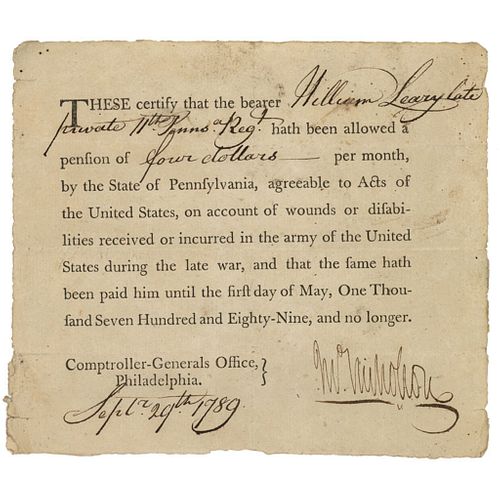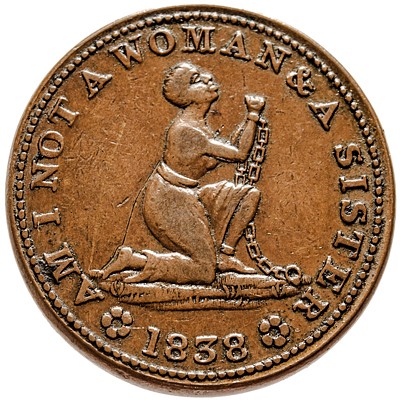1789 JOHN NICHOLSON Signed Revolutionary War Disabilities Pension Document
Lot 180
Categories
Estimate:
$500 - $700
Absentee vs Live bid
Two ways to bid:
- Leave a max absentee bid and the platform will bid on your behalf up to your maximum bid during the live auction.
- Bid live during the auction and your bids will be submitted real-time to the auctioneer.
Bid Increments
| Price | Bid Increment |
|---|---|
| $0 | $10 |
| $200 | $20 |
| $300 | $25 |
| $500 | $50 |
| $1,000 | $100 |
| $2,000 | $200 |
| $3,000 | $250 |
| $5,000 | $500 |
| $10,000 | $1,000 |
| $20,000 | $2,000 |
| $30,000 | $2,500 |
| $50,000 | $5,000 |
| $100,000 | $10,000 |
| $200,000 | $20,000 |
| $300,000 | $25,000 |
| $500,000 | $50,000 |
About Auction
By Early American History Auctions
Feb 27, 2021
Set Reminder
2021-02-27 12:00:00
2021-02-27 12:00:00
America/New_York
Bidsquare
Bidsquare : Black History & Slavery, Historic Autographs, Colonial America & Weapons
https://www.bidsquare.com/auctions/early-american-history-auctions/black-history-slavery-historic-autographs-colonial-america-weapons-6434
318 Lots of Rare, Historic Autographs, Americana, Civil War Era, George Washington, Abraham Lincoln, Slavery & Black History, Revolutionary War Era, Colonial America, Federal Period, War of 1812, Colonial Currency, Historic Early American Guns & more... Early American History Auctions auctions@earlyamerican.com
318 Lots of Rare, Historic Autographs, Americana, Civil War Era, George Washington, Abraham Lincoln, Slavery & Black History, Revolutionary War Era, Colonial America, Federal Period, War of 1812, Colonial Currency, Historic Early American Guns & more... Early American History Auctions auctions@earlyamerican.com
- Lot Description
Autographs
1789 John Nicholson Signed Disabilities Document
JOHN NICHOLSON (1757-1800). State Official, Land Speculator. John Nicholson was a shady Pennsylvania state official who resigned all his state offices in 1794, having been impeached, but acquitted, by the Pennsylvania Legislature just prior to his resignation.
September 29, 1789-Dated Federal Period, Partially-Printed Document Signed, "Jn Nicholson" as Comptroller-Generals Office, Philadelphia, Pennsylvania, 1 page, Octavo, Very Fine. John Nicholson held that office from 1782 to 1794 and was often regarded as "the financial dictator of the state." This Document reads, in part: "Theses certify William Leary late private 11th Penna. Reg't hat been allowed a pension of four dollars per month, by the State of Pennsylvania, agreeable to Acts the United States, on account of would or disabilities received or incurred in the army of the United States during the late war, and that the same hath been paid him until the first day of May, 1789 and no longer..." Uneven edges as made, light stains. Overall Fine condition. A rare original form of the period, and one of the first we have encountered.
Nicholson was a shady Pennsylvania state official who resigned all his state offices in 1794, having been impeached, but acquitted, by the Pennsylvania Legislature just prior to his resignation.
John Nicholson, comptroller general of Pennsylvania and land company promoter, was born in Wales and emigrated to Philadelphia with his brother Samuel prior to the American Revolution.
Nicholson was chosen one of three commissioners of accounts of Pennsylvania in 1781, and in the following year the legislature abolished the commission and appointed Nicholson comptroller general of the state with very broad powers. For the next twelve years Nicholson was the virtual fiscal dictator of Pennsylvania, and under his management the state was the first to be restored to financial stability after the turmoil of the Revolution. Nicholson was a radical in politics and was opposed to the formation of a strong federal government. As the radicals' strength waned after their defeat over the Constitution, Nicholson's high-handed methods increasingly came under attack. He was impeached on a charge of diverting state funds in 1793. He was acquitted by the Senate in 1794 but resigned all his offices.
The charges against Nicholson grew out of his intermingling of private and official business. Nicholson was increasingly involved in land speculation on a truly grand scale, often in partnership with Revolutionary financier Robert Morris. In 1792 they formed the Pennsylvania Population Company with the likes of Aaron Burr and James Wilson. In the same year, Morris and Nicholson sold 200,000 acres on the upper Susquehanna River to a group of refugees from the French Revolution. When they proved unable to meet the terms of their contract, the Asylum Company was formed to manage the property.
The firm of Morris & Nicholson acquired 7,000 lots in the new federal city of Washington and built one-third of the structures that were standing there when it became the national capital. Nicholson, Morris, and James Greenleaf formed the North American Land Company in 1795 with 6 million acres in Pennsylvania, Virginia, North Carolina, South Carolina, Georgia, and Kentucky. On his own account, Nicholson organized the Territorial Land Company in 1796 and the Pennsylvania Land Company in 1797.
Less well known are Nicholson's efforts at promoting economic development through both transportation improvements and industrial innovation. He was the driving spirit behind Pennsylvania's extensive program of roads and canals, including the three private canal companies and the Philadelphia & Lancaster Turnpike, which together formed the centerpiece of the system. The Society for Promoting the Improvement of Roads and Inland Navigation was also responsible for arranging the emigration from England of William Weston, the first professional civil engineer in America.
Nicholson was also joined with Robert Morris in attempting to develop a manufacturing complex at the Falls of Schuylkill near Philadelphia and helped form the Lehigh Coal Mine Company, one of the first ventures to mine anthracite coal.
He sponsored and supported many important American inventors and mechanics, including the steamboat inventor John Fitch, and encouraged the emigration of skilled technicians from England. While most of these ventures foundered for lack of capital, some laid the foundation for future developments.
When the inflationary bubble burst in late 1796, Nicholson was greatly overextended, and his paper empire soon collapsed. Robert Morris went to debtor's prison in 1798 and Nicholson followed in the winter of 1799-1800. Although he tried to salvage his affairs from prison, his optimism eventually failed. He suffered a complete mental and physical breakdown and died in prison on December 5, 1800, leaving debts of over $4 million.
Our Auction Contents:
Black History & Slavery: (Lots 1 - 63)
Abraham Lincoln Related: (Lots 64 - 74)
Historic Autographs: (Lots 75 - 235)
Colonial America: (Lots 236 - 261)
Revolutionary War: (Lots 262 - 304)
George Washington Related: (Lots 305 - 306)
Early American Guns & Weapons: (Lots 307 - 318) - Shipping Info
-
Early American provides in-house worldwide shipping. Please contact us directly if you have questions about your specific shipping requirements.
-
- Buyer's Premium



 EUR
EUR CAD
CAD AUD
AUD GBP
GBP MXN
MXN HKD
HKD CNY
CNY MYR
MYR SEK
SEK SGD
SGD CHF
CHF THB
THB











